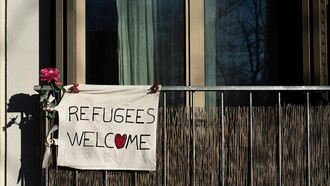The current madness of the wars in the Middle East and the Ukraine have underlined the precariousness of our present human situation by raising the specter of total nuclear war that could easily wipe out humanity. Modern explosive weapons with immense destructive power are fired with automated rapidity and delivered by bombers, missiles, projectiles, and drones with such intensity as to obliterate entire areas of the earth of all living things, let alone all human beings.
In the background to such conflicting systems of obliteration confronting one another with “meat grinder” efficiency lie systems of nuclear weapons, on hair trigger alert, to be launched any time the fallible human beings under the pressure of these merciless wars feel an existential threat sufficient to wipe out all of human civilization is a desperate act of (suicidal) self-preservation. This appears to be our human situation today that no nation, not even the collection of nations called the United Nations, is able to change. How absurd is that?
In Global Democracy and Human Self-Transcendence (sect. 8.5), I showed the incoherence of so-called “just war theory,” which argues that under certain defined circumstances war is legitimate and morally acceptable. The Geneva Conventions reinforce this illusion by formulating the “laws of war,” such as the non-targeting of civilians, thereby tacitly accepting the war-system that continually generates new wars. By doing this, philosopher Errol E. Harris argues, they “increase these evils a hundredfold.” War, Harris rightly argues, “is the negation of law and order” (1950, 63). By legitimizing wars under the Geneva conventions by attempting to define “war crimes,” or “crimes against humanity,” or “crimes of aggression,” they are thereby institutionalizing and justifying this ultimate “negation of law and order.”
It is rather absurd to define terrorism, in which violence is used to harm innocent people in the service of some political or ideological motivation, as the “negation of law and order.” For all militarized nation-states use violence in exactly this way—only they claim that their slaughter of innocent people is merely “collateral damage” to their “just” use of lethal violence for “some political or ideological motivation.” In either case we have the negation of law and order.
I agree, therefore, with Immanuel Kant who, in his late essays, argues not only that war is immoral but that it is immoral to live in any system that does not guarantee the peace through enforceable laws protecting the freedom and equality of all members of the community. “Law and order” is not an empty slogan. It is a condition of being a civilized human being. We are morally obligated to live within a legal community with binding enforceable democratic laws protecting the freedom and equality of each within the framework of the common good of all.
The correct implication of Kant’s principle is that it is immoral to live within a world of militarized sovereign nation-states, for in this world there is no law protecting the freedom and equality of all, only a system of non-binding treaties among powers who deny, by this very system, the legitimacy of any enforceable laws above themselves. Our world system today is a negation of reason, common human decency, and all legitimate ethical integrity. We are morally obligated to pursue democratic world government under some framework such as that offered by the Constitution for the Federation of Earth.
No person should be involved with the war-system in any way that they can reasonably help. We should not be investing in weapons of war, nor designing them, nor transporting them, nor training to use them, nor deploying them. All these activities are deeply and expressly immoral. Each person can and must say, “the buck stops here.” It stops with me. “They can do nothing to make me participate directly in this madness.” The age when being a warrior, representing honor and duty and so-called military virtues, is gone forever. Just as it is immoral to live within a militarized nation-state recognizing no binding laws over all humanity, so it is doubly immoral to participate in the madness of these so-called “sovereign” states. Albert Einstein correctly wrote: “I believe that the killing of human beings in a war is no better than common murder” (1981, 584).
Einstein was familiar with the UN Universal Declaration of Human Rights that appeared in 1948 stating that “recognition of the inherent dignity and of the equal and inalienable rights of all members of the human family is the foundation of freedom, peace and justice in the world.” In his famous “Groundwork” book on ethics, Kant had declared that there is an absolute requirement to “treat every person as an end in themselves and never merely as a means.” As Kant made clear, this is a central formulation of the principle of dignity. To be an “end in oneself” is to have inviolable rights to respect – respect for one’s life, human rights, and dignity as a person. War directly violates this dignity in every way and by every person involved.
In war not only does some government tell me that I am authorized to target and try to kill this or that group of persons designated as the enemy, but I am also not responsible for the “collateral damage” of others who may be in the way of my targeting that enemy. In today’s crowded world, with such horrifically destructive weapons, it is nearly impossible not to kill others not directly targeted. In the current Gaza disaster, beginning in October 2023, many thousands of women and children have been slaughtered in the pursuit of supposed military objectives. In Ukraine, in a period of approximately two years, conservative figures estimate that approximately 500,000 Ukrainians have died along with about 100,000 Russians.
If every person has inviolable dignity, then how can war be justified at all? Even to target the official enemy is to violate their human dignity and right to life. What is this madness that recklessly launches human beings into mutual slaughter and potentially the nuclear holocaust of our entire planet? If respect for dignity is “the foundation of freedom, peace and justice in the world,” then where is our planetary commitment to these values? No wonder the world is such a total mess. This respect is practically non-existent, not only because people are seduced by a global culture of violence, hate, fear, and war, but because the world system of unrestrained capitalism interfaced with militarized national sovereignty places humanity within a structural war system from which there is no escape other than democratic world law under the Earth Constitution.
In Human Dignity and World Order, I wrote about the 1994 genocidal massacre in Rwanda in which conflict between the Tutsi and Hutu tribes murdered nearly one million people within a 100-day period. This engendered a movement within the UN called “The Responsibility to Protect (R2P)” in which nations and supporting human rights groups pledged to develop protocols for intervention in the internal affairs of nations in case of future pending genocides or other crimes against humanity. If people are violating the dignity of others through genocide, the nations pledge to use their militaries to kill the perpetrators to the point where they stop violating each other’s dignity. They murder the murderers in order to stop murder. This is part and parcel with the UN Charter that gives the Security Council the authority to go to war in order to keep the peace, for under the global war-system, there can be no way to keep people from murdering one another except by murdering more people.
The only way to transcend this madness is to establish a world peace system to replace this war-system. But this is forbidden by the obsession with national sovereignty, a sovereignty that is mistakenly associated with freedom. A sovereign nation is somehow “free” because it recognizes no effective laws above itself. Of course, this is not freedom but slavery to the war-system in which no one is free because genuine freedom can only come about, as Kant pointed out, when everyone lives under the rule of democratically legislated and enforceable laws ensuring both freedom and equality for everyone before the law.
The only way to bring humanity forward into a moral framework respecting human dignity and treating everyone as an end in themselves and never merely as a means is to ratify the Constitution for the Federation of Earth. This gifts humanity with a morally-based peace-system that makes possible the actualization of the ethical dimension within human civilization. The present war-system structurally denies human dignity and therefore structurally denies the possibility of developing a morally based human civilization. Our prime objective, and our fundamental moral responsibility, is ratification of the Earth Constitution.
References
Einstein, Albert (1981). Einstein on Peace. Eds. Otto Nathan and Heinz Norden.
Harris, Errol E. (1950). The Survival of Political Man: A Study in the Principles of International Order.
Kant, Immanuel (1964). Groundwork of the Metaphysics of Morals. Trans. H.J. Paton.
Kant, Immanuel (1983). Perpetual Peace and Other Essays. Trans. Ted Humphrey.
Martin, Glen T. (2018). Global Democracy and Human Self-Transcendence.
Martin, Glen T. (2024). Human Dignity and World Order.















